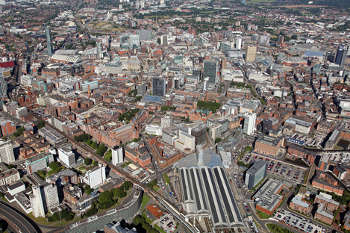London is in line for almost three times more transport investment per person than the North of England - adding up to £2,389 more per head - according to IPPR North.
The lack of pipeline investment is only increasing the historical disparities in transport investment over the last 10 years, with the capital receiving on average more than twice as much public transport spending per capita than the North or the UK between 2008/09–2017/18.

Manchester by air
If the North had received the same amount per person as London over the last 10 years, £66bn more would have been spent in the region.
IPPR North put the difference down to weaker political lobbying structures in the North and a lack of institutional capacity, both of which have improved through the creation of mayoral combined authorities and Transport for North.
Value for money decision-making based on historical data can also create cycles of under investment, however the Government has addressed this with changes to its key appraisal guidance, WebTAG, and a 'rebalancing toolkit'.
IPPR North called on the Government to deliver on the Northern Powerhouse Rail project, build the northern section of HS2 first and invest in some ‘quick wins’ in the North as well as the long-term infrastructure projects.
It also argued for a £400m project development budget for the North and for the devolution of more transport powers so that the North can take responsibility for its own infrastructure.
Historical inequalities
The latest analysis from the economics think tank is part of its annual reporting on transport investment levels throughout the UK, focused on comparisons between the regions.
IPPR North’s analysis of historic spending figures (2008/09–2017/18) shows that:
- London received £739 per capita each year.
- The North received £305 per capita each year
- The UK as a whole received £368 per capita each year
- London has therefore received 2.4 times more public spending per capita on transport than the North, and two times more public spending on transport than on the UK as a whole, on average, each year for the past 10 years
The gap between per capita transport spending in London and per capita spending in the North has increased in the last 10 years.
- Spending on London has increased by £409 per capita since 2007/08
- Spending on the North increased by £162 per capita since 2007/08
- Spending on the UK increased by £157 per capita since 2007/08
- Spending on London has therefore increased by 2.5 times more per capita than on the North and 2.6 times more per capita than the UK as a whole
To 2021 and beyond
IPPR North’s analysis of planned transport investment in the Government's pipeline found that:
- £3,636 per capita is planned on London, compared to just £1,247 per capita on the North
- Planned transport investment on London is therefore 2.9 times higher per capita than on the North
- Planned transport spending on London is 7.0 times more per capita than on the North East (£519. and 7.1 times more per capita than on Yorkshire and the Humber (£511 per capita)
- The North West is set to receive more than the England regional average, at £2,062 per capita, but this is still far less than London
These figures are different to the Government's official analysis, as Whitehall does not include planned spending beyond 2021 and discounts local transport spending in London through Transport for London, as this cash does not come directly from the Department for Transport.
It does however come from the special business rates retention deal that London enjoys.
The result is the Government's analysis does not include excluding 65.8% of planned transport spending - only £40.2bn of the £117.6bn total transport investment in the pipeline.
Register now for full access
Register just once to get unrestricted, real-time coverage of the issues and challenges facing UK transport and highways engineers.
Full website content includes the latest news, exclusive commentary from leading industry figures and detailed topical analysis of the highways, transportation, environment and place-shaping sectors.
Use the link below to register your details for full, free access.
Already a registered? Login